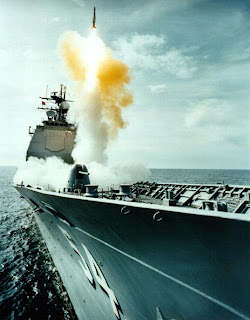
A piece from The Heritage Foundation titled The Next Steps for Missile Defense:
Congress and the American people need to understand that while the United States has made progress in putting missile defense systems in the field in recent years, in most respects the U.S. remains vulnerable to this threat. This is no time for the U.S. to slow the pace of developing and deploying effective defenses against ballistic missiles. Indeed, the Bush Administration and Congress need to accelerate the effort by focusing on developing and deploying the systems that offer the greatest capability.Democrats are not as strong in support of missile defense as they might be...
Further, the change in party control in Congress has put a number of missile defense skeptics in leadership positions. For example, Senator Carl Levin (D– MI), the new chairman of the Senate Armed Services Committee, has stated that he considers it a mistake to buy missile defense interceptors before they have proven themselves in operational tests.[4] This seemingly anodyne statement actually reveals his intention to stop many missile defense activities, because the interceptors and other elements of the defense must be purchased and fielded in order to be tested.Progress has been made:
As of July 2006, 11 Aegis destroyers had been upgraded to track ballistic missiles in flight.[13] While an incorrect system setting blocked a test of the Standard Missile-3 on December 7, 2006, prior to that test, the Standard Missile-3 performed successful intercepts in seven out of eight attempts.[14] At this time, three cruisers and three destroyers are capable of engaging short-range and medium-range ballistic missiles in the midcourse stage of flight with the Standard Missile-3.[15] Finally, the Navy successfully tested the existing Standard Missile-2 Block IV against a short-range target missile in May 2006.[16] During the test, this system destroyed the incoming missile in the terminal phase of flight.Among areas of described vulnerability:

In the near term, lesser missile powers, maybe including terrorist groups, could attack U.S. territory by launching a short-range Scud missile from a container ship off the coast. Congress should express its concern about this threat and direct the Navy to take steps to counter it.See also here and here.

No comments:
Post a Comment